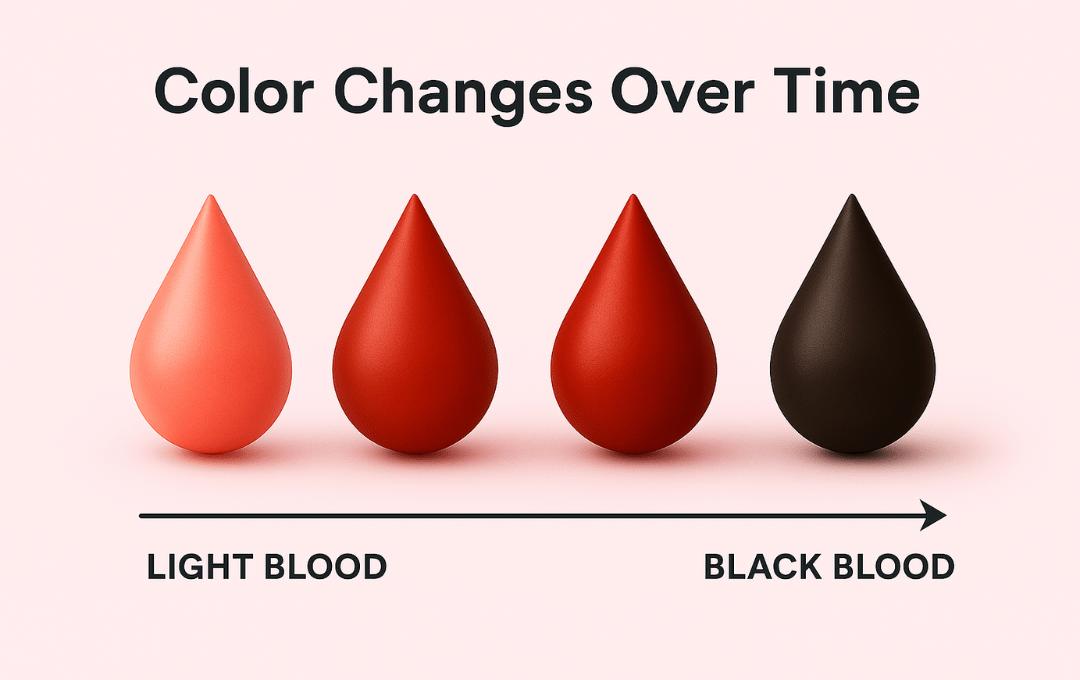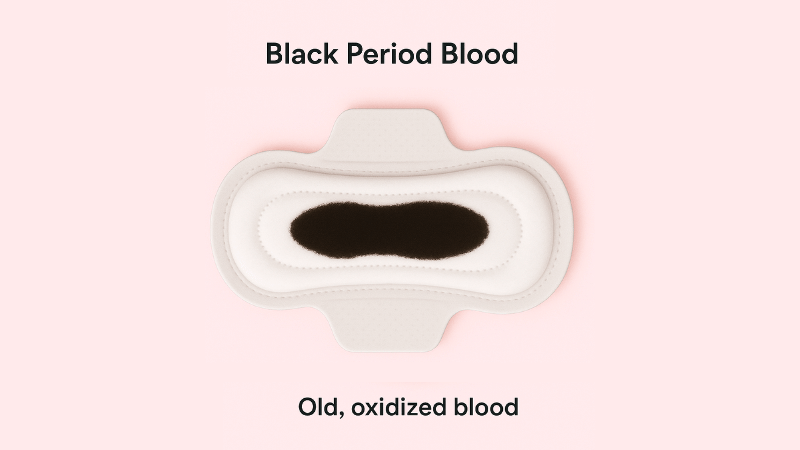
The first time you see black period blood can be unsettling. Understandably, you may wonder why your menstrual blood is black, especially if it hasn’t happened before. However, it can be a regular part of the menstrual process.
While it’s often harmless, there are situations where black blood during a period can signal an underlying issue, such as uterine fibroids, a hormonal imbalance, or infection. Understanding what causes this color change and when to visit a doctor can help you stay proactive about your reproductive health.
Black Period Blood Meaning
Black period blood is typically old blood that has oxidized while remaining in the uterus or cervix. As blood sits and is exposed to oxygen, its color naturally darkens, shifting from bright red to dark brown or even black. Delayed blood flow may be linked to underlying conditions that interfere with normal menstruation, such as uterine fibroids.
Is Black Period Blood Normal?
In many cases, black blood during a period is a normal variation of your menstrual flow. This color change is especially seen at the beginning or end of a menstrual cycle when the flow is lighter and moves more slowly. However, if other symptoms accompany black period blood, that could indicate an underlying condition. You should seek medical advice if you also experience:
- A strong, unpleasant odor
- Pelvic pain or pressure
- Irregular bleeding patterns or clotting
How Long Should Black Period Blood Last?
Black period blood often lasts for a day at the beginning or end of a period when the flow is lighter. If it continues for several days or if you’re also experiencing severe cramps, a foul odor, heavy bleeding, or other unusual symptoms, it’s best to consult a fibroid specialist.
Why Is My Period Blood Black and Thick?
Black and thick blood during your period can occur due to older blood or tissue shedding more slowly. As it remains in the body, blood oxidizes and darkens, sometimes developing a thicker texture that may resemble sludge or coffee grounds. It may also result from delayed uterine contractions or interference caused by uterine fibroids.
In some cases, thick, dark blood is linked to clot formation, a natural part of heavier menstrual flow. However, if clotting is excessive or accompanied by symptoms like pelvic pain, fatigue, or irregular cycles, it could be a sign of an underlying condition such as uterine fibroids, hormonal imbalance, or endometrosis.
What Causes Black Blood During Your Period?
While black period blood is often linked to natural processes within the menstrual cycle, several underlying factors can also contribute to black blood during a period. Understanding these potential causes can help determine whether further evaluation by a healthcare provider is necessary.
Uterine Fibroids
Uterine fibroids are noncancerous growths that develop in the uterus and can interfere with regular menstrual flow. They may cause the uterine lining to shed unevenly or incompletely. Older blood is retained and released later as black period blood or dark brown discharge.
Additional symptoms of fibroids can include pelvic pain and cramping, frequent urination, and heavy menstrual bleeding. These symptoms may indicate larger or multiple fibroids that could require medical evaluation and treatment to avoid complications, like anemia or infertility.
LEARN MORE ABOUT UTERINE FIBROIDS
Slower Uterine Shedding
Black blood from your menstrual period can also happen due to slower uterine shedding, which often occurs near the end of the menstrual cycle, when contractions naturally slow down. For some individuals, this delayed blood flow is simply a normal part of their cycle. This delay gives the blood time to oxidize and darken before leaving the body.
Hormonal Imbalances
Fluctuations in hormones, particularly estrogen and progesterone, can affect how the uterine lining builds up and sheds. If the uterine lining has more time to build up than usual, there is a higher chance of having black period blood in a darker, thicker form. Hormonal imbalance can also lead to irregular periods, severe PMS, and changes in acne or weight. If left untreated, it can lead to chronic discomfort during menstrual cycles.
Infections or Blockages
Pelvic infections like pelvic inflammatory disease (PID) or blockages in the reproductive tract can prevent blood from flowing freely. This blockage may cause blood oxidation and a foul odor, along with unusual vaginal discharge, pain during urination, and a fever. In such cases, black period blood is a sign to seek immediate medical care, especially if symptoms last more than a few days. Untreated infections or blockages can lead to long-term damage to reproductive organs.
Black Period Blood vs. Black Discharge
While both may appear similar in color, black period blood and black vaginal discharge often indicate different things. The key differences come down to timing, causes, and potential concerns.
| Characteristic | Black Period Blood | Black Vaginal Discharge |
| Underlying Conditions | Uterine fibroids, hormonal imbalances, and slower uterine shedding | Pelvic inflammatory disease (PID), cervical infections |
| Timing | Occurs during menstruation, typically at the beginning or end of a period | Happens outside the menstrual cycle |
| Primary Cause | Old, oxidized blood is shedding and exiting slowly from the uterus | Old blood, infections, or reproductive health issues |
| Consistency | Thick, tar-like, or clotted, similar to dried blood | Can vary from thick to watery depending on the cause |
| Odor | Metallic or musty | Foul odor may indicate infection or a foreign object |
| Color | Results from oxidation, as blood remains in the uterus longer | Color darkens due to delayed shedding or obstructed flow |
Timing, odor, and consistency are clues that there may be other underlying causes, and recognizing the differences can help you understand what’s normal for your body—and when it might be time to consult a specialist.
When to See a Doctor for Black Period Blood
While occasional black blood during your period is normal, medical consultation is recommended if you are experiencing:
- A strong or foul odor
- Heavy, irregular bleeding
- Painful menstrual cycles and cramps
- Pelvic and back pain
- Pain during intercourse
- Frequent urination
- Persistent fatigue
These symptoms may indicate uterine fibroids, infection, or other gynecological conditions that require professional evaluation and treatment. Take our quiz to see if fibroids could be the cause and learn the next steps toward relief.
Black Period Blood Diagnosis and Treatment
If black period blood is persistent or has concerning symptoms, a pelvic exam, ultrasound, and lab tests may be needed to determine the cause. Depending on the diagnosis, treatment options can include:
- Hormonal Therapy: Balances estrogen and progesterone levels to regulate menstrual cycles and reduce heavy or prolonged bleeding. By preventing excessive buildup of the uterine lining, hormonal therapy helps lower the chance of old blood being retained and turning black before it exits the body.
- Antibiotics: Prescribed to treat infections, such as pelvic inflammatory disease (PID), and restore normal menstrual flow. As the infection clears, blood exits the body more efficiently, reducing the likelihood of oxidation and dark discoloration.
- Uterine Fibroid Embolization (UFE): A minimally invasive treatment to address fibroids and alleviate symptoms, such as heavy and delayed bleeding. By shrinking the fibroids and improving blood flow from the uterus, UFE helps prevent blood from lingering and darkening inside the body.
Learn More About How UFE Can Help
Manage Black Period Blood with USA Fibroid Centers
Knowing what black period blood means can help you recognize what’s normal and when to consult a medical professional. At USA Fibroid Centers, our fibroid specialists can help determine whether any persistent black period blood and accompanying symptoms indicate an underlying health condition, like fibroids.
USA Fibroid Centers specializes in uterine fibroid embolization (UFE), a non-surgical, outpatient procedure that targets the blood flow to fibroids. By blocking the blood supply to fibroids, UFE causes them to shrink, reducing heavy bleeding, pressure, and period irregularities like black or prolonged blood flow. UFE preserves the uterus and has a recovery of one to two weeks, making it a leading option for fibroid-related menstrual issues.
We have locations nationwide and accept most insurances, including Medicaid and Medicare plans. You can schedule a consultation online or call 855.615.2555 to take the next step toward answers and relief.
FAQs About Black Period Blood
What’s the Difference Between Implantation Bleeding and Black Period Blood?
Implantation bleeding and black period blood differ in timing, color, flow, and associated symptoms. Implantation bleeding occurs when a fertilized egg attaches to the uterine lining, resembling light spotting or bleeding. Black period blood is a menstrual flow variation, typically due to old blood exiting the uterus.
Can Stress Cause Black Period Blood?
Stress can cause black period blood as it disrupts hormone levels by triggering the release of cortisol, which delays the shedding of the uterine lining, allowing more time for oxidation and color change.
Is Black Period Blood Common During Perimenopause?
Black period blood is common during perimenopause due to the hormonal fluctuations that occur throughout this transitional phase. As estrogen levels rise and fall unpredictably, changes in the uterine lining can release older blood, which appears dark brown or black.




